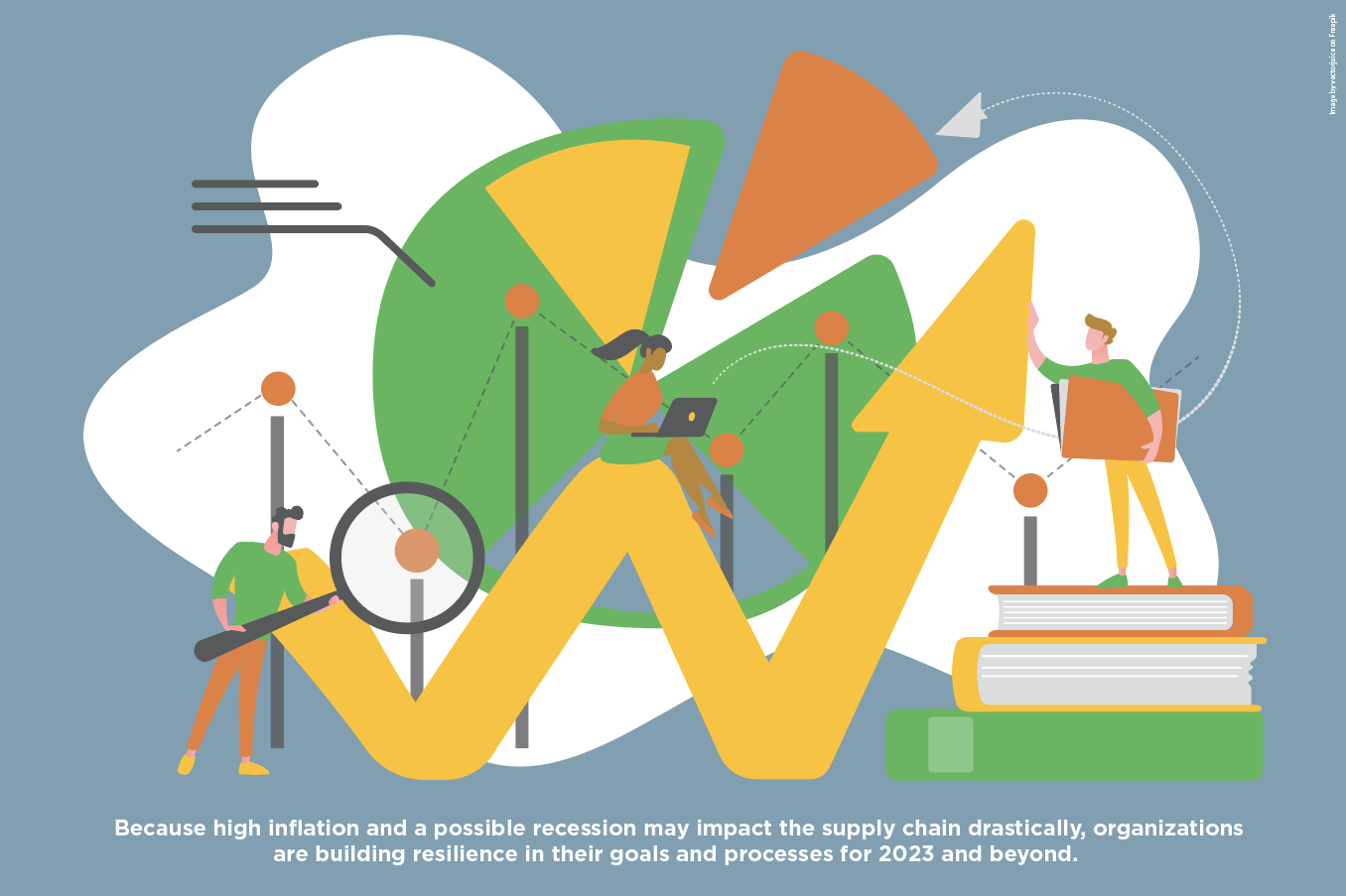As organizations across the globe continue to navigate challenging economic conditions, which are forecasted to remain volatile for the foreseeable future, businesses are prioritizing supply chain resilience. Learn more about the potential consequences of an economic downturn on global distribution channels and how teams are building adaptability and agility into their organizations moving forward.
The true impact of a recession on the supply chain
Modern supply chains are increasingly complex and have faced unprecedented disruptions in recent years. Networks and distribution channels are combating several daunting challenges, including:
- Labor shortages.
- Global inventory scarcity.
- Port bottlenecks and congestion.
- Changing consumer behaviors.
- Inflation.
- The risk of recession.
While recessions often take the world by surprise, the Federal Reserve’s interest rate policies have led economists to believe we are due for a sharp economic downturn. After months of recession forecasts, however, the question remains, will there be a recession — and when? Unfortunately, the short-term outlook is still unclear, but according to the February 2023 NABE Outlook survey, 58% of economists believe a recession will occur during 2023.
A looming recession could take a toll on an already afflicted global supply chain by compounding the various issues distribution channels have been experiencing. While it is impossible to predict how severe such impacts might be, here are a few ways an economic downturn could affect the supply chain:
- Reduced demand: Recessions typically bring about a decline in demand for many products and, in turn, the price of goods. Lower prices considerably cut into the profitability of all companies.
- Furthered disruptions: As businesses cut costs and reduce investments in production and logistics, distribution networks are at risk of delayed deliveries, shortages of raw materials, and more.
- Financial instability: A looming recession hinders business growth as companies face cash flow challenges, reduced access to credit, and limited investment opportunities.
- Potential supplier bankruptcies: Suppliers or manufacturers that fail to stay afloat amid a recession can cause a ripple effect on the entire supply chain — forcing teams to find alternative suppliers or risk delays in their operations.
Building a more resilient supply chain during times of economic uncertainty
With continued supply chain disruptions and projected recession in mind, organizations across industries require more resilient distribution channels to navigate uncertain waters more effectively. What is a resilient supply chain? It refers to responding quickly to emerging changes and operational disruptions — often by utilizing adaptable contingency planning and predictive analysis. Despite the growing necessity of a flexible and agile supply chain, Gartner reports that only 21% of supply chain organizations believe their network is “highly resilient.”
Here are some of the top strategies organizational leaders and chief supply chain officers (CSCOs) are using to set the right course for resilience in 2023 and beyond:
- Identify resource bottlenecks: Determining resource congestion can help guide cost-reduction efforts and prioritize risk management. CSCOs can invest in backup suppliers and alternative logistics solutions to prevent disruptions arising from future bottlenecks.
- Make strategic decisions considering recession recovery predictions: Taking recession projections into account enables leaders to anticipate potential shifts in supply and demand patterns and adjust operations accordingly — mitigating the fallout of an economic downturn and positioning the company for long-term success.
- Diversify suppliers and manufacturing partners: A complete reliance on a single supply source or partner can spell disaster for an organization amid a recession. Building relationships with various suppliers and manufacturing partners helps maintain a stable supply of commodities throughout uncertainty.
- Introduce digital technologies to boost visibility and minimize risk: Solutions that offer real-time visibility into supply chain operations promote faster response times and data-driven decision-making. Oracle Cloud technology can provide a more holistic approach to managing distribution channels that support the continuity of operations during an economic downturn.

The key benefits of a more agile and adaptable supply chain
As CSCOs and business leaders develop comprehensive strategies to strengthen supply chain agility and adaptability, they can see several benefits as a result:
- Cost optimization: A more resilient supply chain helps reduce costs by improving efficiency, mitigating waste, and ensuring the organization is not overpaying for materials or services.
- Increased customer satisfaction: When teams ensure the timely and accurate delivery of products, they are more likely to maintain customer satisfaction and loyalty during disruption.
- Enhanced risk management: An agile and well-oiled supply chain helps businesses mitigate risk, reducing the likelihood and impact of disruptions caused by economic downturns and other unforeseen circumstances.
- Improve productivity: Greater efficiency in combination with streamlined workflows from a resilient supply chain can lead to faster cycle times and reduced downtime, allowing organizations to produce more with the same number of resources — all while meeting consumer demand more effectively.
Navigating risk with the Enterprise Control Tower
Continuous and integrated supply chain planning with the support of cutting-edge technology is essential for organizations to navigate uncertainty and risk. Leveraging technology that minimizes the impact of inflation and a potential recession enables teams to anticipate challenges, make operational adjustments in real-time, and build the resilience necessary to keep pace with rising prices and fluctuating consumer demands.
With the Enterprise Control Tower from Inspirage, your business can empower an agile and highly responsive supply chain by connecting functional silos and disparate systems to provide deeper insights, aid quicker decision-making, and deliver actionable intelligence. Learn how Inspirage’s Enterprise Control Tower, powered by Oracle Cloud, can help your organization improve supply chain resilience and minimize risk. Contact us to learn more.